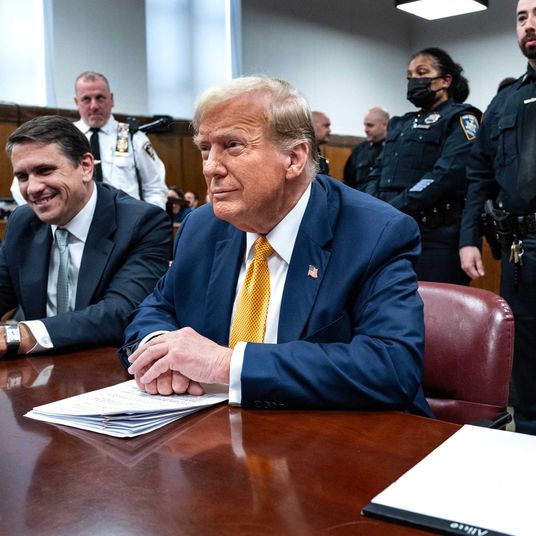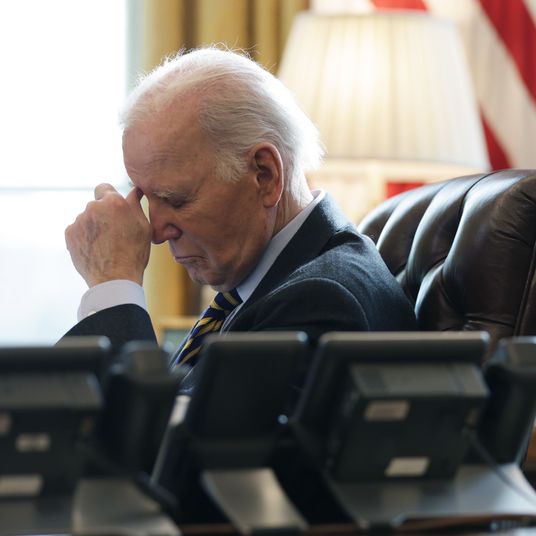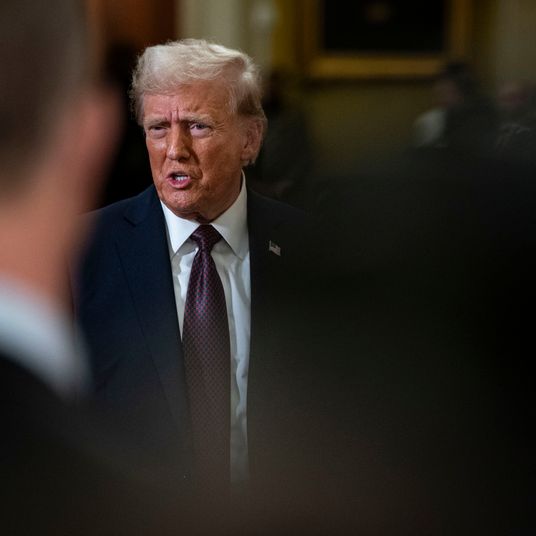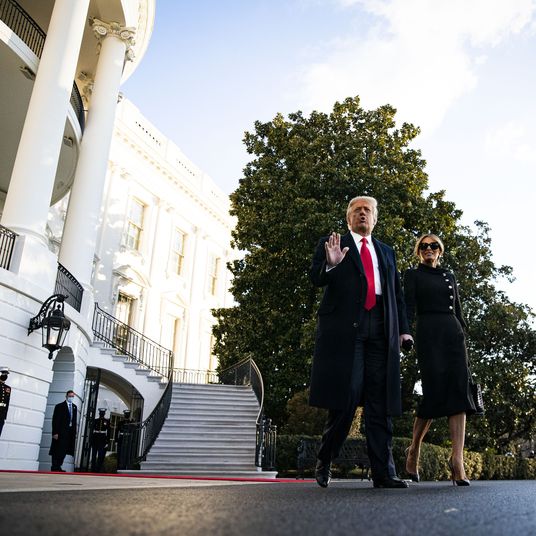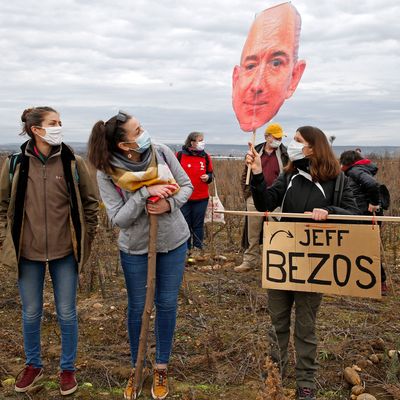
The American tax code is kind to billionaires. And billionaires can afford to assemble teams of advisers dedicated to innovating bespoke schemes for making our tax laws even more generous. As a result, the very richest among us routinely pay lower tax rates than working-class families.
All this has been apparent for a long time. But thanks to some public-spirited criminal with access to the closely guarded files of the IRS, the precise terms of the billionaire class’s sweetheart deal grew more visible this week. According to tax records leaked to ProPublica, between 2014 and 2018, the 25 richest Americans collectively grew $401 billion wealthier, while paying only 3.4 percent of that sum to Uncle Sam.
In response to this revelation, progressives have redoubled their calls for new taxes on the superrich in general and an annual levy on ultramillionaires’ wealth in particular. Democratic Senators Elizabeth Warren and Ron Wyden have led this charge, flanked by legions of left-wing pundits. Their cause is a righteous one, but imposing an annual toll on Jeff Bezos’s fortune — and soaking the superrich more broadly — won’t get us too far down the road to a just economic order.
To elucidate this point, let’s explore a simple (and stupid-sounding) question: Why is it bad that the superrich pay low tax rates?
One common answer is that plutocratic tax avoidance prevents America from building a proper welfare state. After all, every dollar that sits in Elon Musk’s bank account is one that can’t be spent on public goods. During her presidential campaign, Warren suggested that the U.S. could have universal child care, free public college, affordable housing, and various other permanent social programs — if only the ultrawealthy forfeited a small fraction of their fortunes to the taxman every year.
But this almost certainly isn’t the case.
The economic constraint on federal spending is inflation, not dollars. No matter how many bucks Jeff Bezos hoards, the U.S. government will not run out of them, because the U.S. government can print dollars at will. What Uncle Sam can’t do is mint real resources. At any given time, there are only so many workers, factories, yoga studios, etc. available for commerce. Public policy can increase the supply side of the economy to a point, but if Congress exponentially increased its deficit spending — by debt-financing a Nordic-style welfare state, say — then too many dollars would chase too few goods and services, and prices would soar.
Once you accept that the real constraint on public spending is scarce resources — not scarce dollars — then the connection between America’s undertaxed megabillionaires and its underfunded welfare state becomes rather tenuous. “Paying for” new social programs with taxes on billionaires is great politics. From the standpoint of inflation prevention, however, it’s much like paying for programs through deficit spending: If you finance a child allowance with a wealth tax, then the working class’s collective consumption will go up significantly, while the ultrarich’s consumption will be scarcely affected. (Elizabeth Warren’s wealth tax would have cost Jeff Bezos $5.7 billion last year. It is implausible that Bezos would drastically reduce his personal spending if he were worth “only” $183.3 billion instead of $189 billion.) The end result will be more dollars circulating through the consumer economy.
Of course, one could theoretically raise the wealth tax to a confiscatory level (while, somehow, preventing billionaires from renouncing their citizenship and fleeing the country before their wealth is expropriated). But your fiscal policy cannot simultaneously abolish the ultrarich through expropriation and fund new social programs by taxing the ultrarich.
Personally, I believe that establishing a child allowance and investing in green jobs is much more important than minimizing inflation. And since Democrats have little will to tax anyone but the ultrarich — and operate under the delusion that limited dollars constrain spending — I wholeheartedly support Joe Biden’s plan to “pay” for his modest expansion of social welfare and green investment with taxes on the wealthy.
But if progressives want to make Warren’s campaign plans a reality, and bring something resembling social democracy to the United States, then they’ll have to overcome the American public’s allergy to broad-based taxation. Anti-0.1 percent populism is a sound political creed for a center-left party that is increasingly dependent on the support of affluent professionals. But, eventually, progressives will need to soak the Romney-Clinton suburbs or forfeit the bulk of their agenda.
A second prominent answer to our opening question goes like this: We need billionaires to pay higher taxes because concentrated wealth is antithetical to democracy. As the economists Gabriel Zuman and Emmanuel Saez write, “Wealth is power. An extreme concentration of wealth means an extreme concentration of power: the power to influence government policy, the power to stifle competition, the power to shape ideology. Together, these amount to the power to tilt the distribution of income to one’s advantage.”
This is absolutely right. The best reason to tax the super-wealthy is to make them less super-wealthy. Last year, Americans spent roughly $14.4 billion on their presidential election, making it the most expensive campaign in history. Bezos could have spent that same sum trying to influence the election (through ads, super PACs, field offices, etc.) and still grown $60.6 billion richer over the course of 2020. Of course, Bezos did not do that. But his latent power to spend at that mind-bending scale serves as a de facto veto on Congress’s power to challenge Amazon’s core interests. The collective economic power of America’s financial elite, meanwhile, is reflected in our tax code’s generous treatment of capital income, and the aberrant weakness of American labor protections.
So, wealth-tax proponents are right that concentrated economic power is antithetical to democracy. But no one in American politics is proposing a wealth tax large enough to meaningfully redress the problem that Zucman and Saez identify. As already noted, Warren’s wealth tax would cost Bezos a tiny fraction of his fortune. And it would scarcely put a dent in the broader economic elites’ wildly disproportionate influence over politics, culture, popular ideology, and, of course, economic development.
One can imagine a tax policy comprehensive enough to radically diminish that influence. But good luck getting Congress to pass such a plan. As is, Democrats don’t appear to have the votes to restrict “stepped-up basis,” the law that allows Americans who inherit unrealized capital gains to cash them out without paying a cent in taxes. Joe Biden’s proposal actually allows wealthy heirs to retain this tax break on their first $1 million of inherited assets — and it has still attracted vigorous opposition among moderate Democrats in the House and Senate.
The contradiction between concentrated wealth and democracy is inherent in capitalism. And, historically, the only force that has managed to check the economic, social, and political power of moneyed elites has been mass labor movements.
None of this means that a wealth tax is undesirable. What it does mean, though, is that anti-.01 percent populism has major limitations. Soaking the Bezoses and Musks of the world will not be sufficient to finance social democracy, nor to meaningfully reduce elite domination of democratic politics. And by all appearances, it is not politically possible to impose confiscatory taxes on the billionaire class, let alone collect them. Given the average annual rate of return on capital, Warren’s wealth tax would merely slow the growth of massive fortunes, not reduce them. Yet even that proposal looks too radical to pass through America’s exceptionally undemocratic and laborious legislative system.
Getting Congressional Democrats to impose modest tax increases on the ultrarich — so as to finance modest increases in socia-welfare spending — is a worthy near-term goal. But the progressive movement’s broader aims can only be realized through middle-class tax increases and working-class power.






